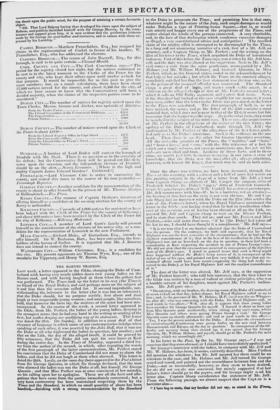THE BARNES TRAGEDY.
LAST week, a letter appeared in the Globe, charging the Duke of Cum- berland with having very nearly ridden down two young ladies on the Barnes road, and with having laughed at them when the gallant feat was performed. The Times took up the letter in its way (the Times is no friend of the Royal Duke), arid said perhaps more on the subject of' it and him than the .occasion called for. It seemed improbable, not- withstanding the inference in the letter (for it was but an inference), that the Duke should, for no purpose earthly, first alarm and then laugh at two respectable young women ; and most people, like ourselves, held, that however the facts lay, the motives of the actor had been mis- interpreted. In the course of the week, a second letter appeared in the Globe, from Mr. Perfect, the father of the young ladies, denying in the strongest terms that he had any band in the writing or sending of the first, but neither denying nor qualifiling any of its statements. This letter was dated the 21st. On Sunday, in addition to a great deal of that elegance of language in which some of our contemporaries indulge when speaking of each other, it was asserted by the John Bull, that it was not the Duke at all who frightened the ladies in question, but another ; and that on the 15th, the day of the alleged insult, it could be proved by fifty witnesses, that the Duke did not quit his own house at Kew during the entire day. In the Times of Monday, appeared a third let- ter from the author of the second, in which, after repeating the words of the first paragraph of the latter communication, Mr. Perfect stated his conviction that the Duke of Cumberland did not mean to alarm the ladies, and that he did not laugh at them when alarmed. This letter is dated the 20th. Lastly, on the same day there appeared in the Post a letter from Sir George Quentin, in which Sir George declared, that the man who alarmed the ladies was not the Duke at all, but himself, Sir George Quentin ; and that Miss Perfect was at once convinced of her mistake, on his calling upon her to apologize. These are all the fact§ and alle- gations that have come from the parties immediately concerned ; but a very keen controversy has been maintained respecting them by the Tunes and the Standard, in which no small quantity of abuse has been bandied,.—finishing with a strong recommendation by the Standard to the Duke to prosecute the Times; and promising him in that case, whatever might be the nature of the Jury, such ample damages as would make Babylon a type of Printing-house Square,—that is, as would ruin utterly and beggar every one of the proprietors of the Times, and scatter abroad the whole of the persons connected. A very charitable, and, in the face of that declaration which condemns excessive damages as illegal, a very constitutional advice and anticipation ! The ravelled skein of the mighty affair is attempted to be disentangled by the Times, in a long and not unamusing narrative of a visit, first of a Mr. Jelf, an attorney, and a Captain Sharp, to Mr. Perfect ; and the writing on the 21st of his letter to the Times, which acquitted the Duke of intentional rudeness. Part of this letter, the Times says, was wri t ten by Mr. J elf him- self, and the date was also altered at his suggestion. Next to Mr. Jeff's visit conies a visit front the same gentleman, accompanied by a Mr. Holmes [not Mr. William Holmes] and Genend Quentin, to Miss Perfect, which, as the General states, ended in the acknowledgment by that lady of her mistake ; but whit+ the Times on the contrary alleges, completely satisfied her that the first statement was the true one, as far as the person of the assumed offender was concerned. The Standard chops it great deal of logic, and wastes much noble anger, in a criticism on the alleged ela age of date of' Mr. Perkers second letter ; which it vans an Old Bailey argument, and it great deal more. Now, if the Siaedart/ had looked at the steadily for OHO moinent, it must have seen, either that the letter to the Giohe was post-dated, or the letter to the Times was antedated. The first paragraph of both is, as we have noticed, the same ; and as the letter of the 20th contains a most material fact, which does not:appear in that of the 21st, it seems Lilt fair to assinne that the former was the copy. As to the oh het I:icts, they must
■ veigheil by the validity of the winicsses. These arc—the acquiescence of Dir. Perfect in the allegations of the writer of' the first letter ; the
apology of the Duke of Cumberland, made through Jell.; the conliri;aition by Mr. Pt rfect ul the allegatioes of the first ktter, quali- fied only to to the I ?like's intentions. Such is the evidence on the one halal. Then there is on the other Sir George Quentin's assertion. All the rest—the quarrels of the Press, the " reptiles," and "liars," and " brazt it Lees," and " curs," with the fifty witnesses of a, fact to which not a singii." tritness, not even an allOnyllioliti one, has yet set his sea 1—are mire cloth 1' and bran. Looking to these facts, and to these alone, we would • feel little hesitation iii saying, in our preset state of knowledge, that the Duke asis the man after all ; aln-sys admitting, however, ssith honest Sir Roger, that much may be said on both sides.


















































 Previous page
Previous page